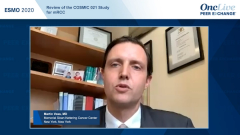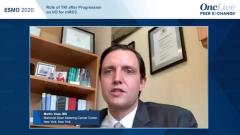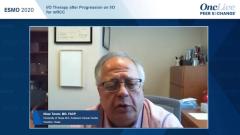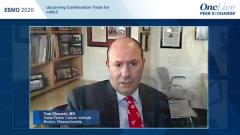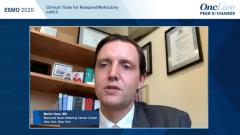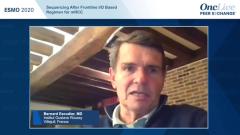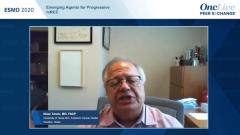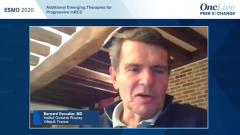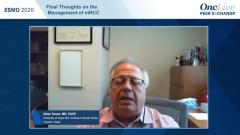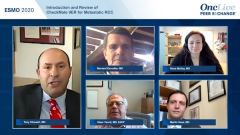
Role of TKI After Progression on I/O for mRCC
Episodes in this series

Transcript:
Toni Choueiri, MD: Martin, you bring up a great point because I’ve seen both and that’s why you are part of the CONTACT-3. You and Nizar have seen both. Once the patient’s tumor has progressed on I/O, [immuno-oncology], nivolumab/ipilimumab, cabozantinib/nivolumab, pembrolizumab/axitinib, would you use a single-agent TKI [tyrosine kinase inhibitor] or would you say, “I’m taking the pembrolizumab/lenvatinib data, the report in JAMA Oncology, I’m taking atezolizumab/bevacizumab data on the crossover, and I’m going to have an I/O?” Would you do that or do single-agent TKI?
Nizar Tannir, MD, FACP: We must be data-driven. And until there is high-level evidence showing that you need to continue with the PD-1 or the PD-L1 blockade, after already progressing on immune checkpoint inhibitors. Until we have that data from CONTACT-3, or a sequel phase 3 trial to HOPE 111, that Martin alluded to, pembrolizumab/lenvatinib vs lenvatinib, until we have those data and we see that combination arm with pembrolizumab plus lenvatinib or atezolizumab plus cabozantinib beating the single-agent TKI…it is not scientific, and irresponsible, to prescribe PD-L1 after progression on immune checkpoint inhibitors. In Europe, they’ll never do that. Pembrolizumab/axitinib is not approved in Europe as second-line therapy. I wouldn’t think that they will approve pembrolizumab/lenvatinib based on just HOPE 111 post-nivolumab/ipilimumab. We must be good stewards of our resources. Health care is so expensive, and there’s toxicity when you combine a PD-1 or a PD-L1 plus a TKI. Until CONTACT-3 shows positive data, or a subsequent phase 3 trial with pembrolizumab/lenvatinib vs lenvatinib shows positive data for the combination, I will use only a TKI.
Toni Choueiri, MD: Martin, what do you think?
Martin Voss, MD: I’m not going to dodge your question by answering what the community is doing, I’ll be honest about this. Nizar is making a couple of important points, and the question of resources and the financial toxicity of what we do can’t be understated. What I do in my own practice, I try to be a little bit nuanced about it if I can. The question as to how the disease has behaved up until and through first-line therapy speaks to it because I understand that getting a second I/O TKI without the underlying phase 3 data that we need is juggling resources somewhat irresponsibly. But also, if someone just blew through first-line therapy, and I don’t think that they’re likely to respond to TKI alone, the question is putting them on the TKI alone out of principle, is that a good use of resources?
We have responsibility for our patients. Someone who has rapidly progressed through nivolumab/ipilimumab, for instance, in the first line, absolutely I’ll put the patient on a TKI I/O combination. I understand that axitinib/pembrolizumab was not developed in that space, but we have a lot of data that say it will likely be highly active. I believe that it will be. In some ways, what we are seeing now is a more complex version of what happened in kidney cancer 10 years ago when we started to learn that you can take one TKI, after another TKI, after another TKI. And people wouldn’t stop in the third line because there was no FDA approval. We didn’t say, “Alright, well, we’ve given them pazopanib and then axitinib. They can’t get everolimus because they just had pneumonitis. I’m not going to give them a third TKI because we don’t have an FDA label.” But the moral dilemma here is, that now we have more than 10 regimens on the market. And Nizar is right, for most patients we have the choice and we have the moral obligation if we think that that’s a reasonable thing to do clinically to use the resources responsibly.
Toni Choueiri, MD: One thing is that we do have prospective data with axitinib, retrospective with cabozantinib post-I/O, and the responses are quite high in the tumor shrinkage. I wouldn’t be surprised…even with the lenvatinib/pembrolizumab study, if this all the TKIs. I’m only aware of CONTACT-3 in the randomized fashion unless there is something else. CONTACT-3 is a study post-I/O, randomizes patients with clear cell and some non-clear cell histologies to cabozantinib as control vs the combination of cabozantinib and atezolizumab. Bernard, in France are you giving I/O post-I/O or is it a nonstarter because you cannot get reimbursed?
Bernard Escudier, MD: No, we cannot give I/O post-I/O. It's not that we're not reimbursed because the system is not done like that. But we're not allowed to do that. My point on this discussion is that I'm a afraid that since we have done so much biomarker work, we know that some patients don't need VEGF and some patients don't need I/O. The question for me now is how to change our way to treat patients. What can we do? I would agree with Nizar that some patients would need nivolumab/ipilimumab. And as we don’t have better biomarkers…I think PD-L1–positive tumors have a lot of chance to respond to I/O. I would use I/O-I/O in this patient, certainly, and I have no doubt that this patient should be treated with I/O-I/O because VEGF doesn’t work very well in those patients. Whatever we use, cabozantinib has a little activity but not a lot. Axitinib has little activity, so we should use I/O-I/O. And probably the rest of the patients need to have a TKI, and that’s why the question would be more between pembrolizumab/ axitinib and nivolumab/cabozantinib, in my opinion, at that point here. If we have to do a study, I would not do a large phase 3 nivolumab/ipilimumab versus nivolumab/cabozantinib, or vice versa. I would do it in PD-L1–positive patients because that’s, for me, the best hypothesis we have. I/O-I/O works very well in PD-L1–positive patients, at least in the retrospective analysis of CheckMate-214.
Transcript Edited for Clarity


